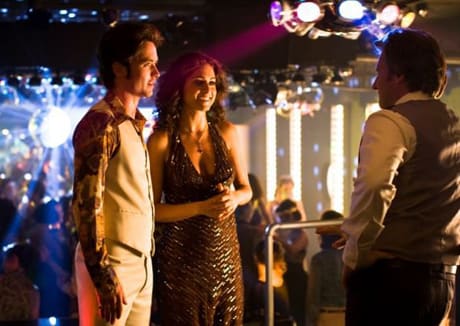One of the major problems with making a film about vapid people in a superficial setting, such as the disco era, is inadvertently making a film that is itself vapid and superficial. An overall quiet resentment and air of superiority towards the characters turns them into mere caricatures, given their cipher status, while attempts to criticize overly familiar trademarks of the time period come off as broad and clichéd without any context or original perspective.
Unfortunately for Funkytown, these flaws and errors in judgment are just scratching the surface of the many insurmountable missteps, offensive stereotypes and marauding images floating around listlessly for its bloated two-and-a-half-hour runtime.
Taking place in late '70s Montreal in and around the Starlight (based on the real life Limelight), this seeming admonition and borderline commination tells the story of two aging, ersatz celebrities that offer fleeting stardom to eager young eye candy in exchange for sexual favours and ego validation.
One is Bastien Lavallée (Patrick Huard), the host of television program Disco Dance Party, who gets wrapped up in an affair (and cocaine) with younger model Adriana (Sarah Mutch). The other is homosexual fashion and trend expert Jonathan Aaronson (Paul Doucet), who preys on aspiring dancer and closet case Tino (Justin Chatwin).
Secondary storylines about lip-synching disco artists, flailing ex-folk musicians, sociopathic club owners and the 1980 Quebec referendum buzz around the periphery to contextualize and ensure every era bromide is covered, presumably trying, and failing, to make this some sort of parable about neglecting French-Canadian culture.
That's all fine, but every single shot, sequence and idea comes directly from other superior, similarly themed pieces, such as Boogie Nights, Saturday Night Fever, The Last Days of Disco and even crud like Summer of Sam and 54. It's as though Funkytown is a canon compendium of all things '70s, awkwardly replicating Paul Thomas Anderson tracking shots in the hopes of masking the lack of vision and imagination.
Because every single moment is anticipated and handled with shallow condescension and since each character is devoid of any thought beyond performing their stereotype, we're left with nothing but imagery and costumes to sustain our attention for the poorly paced duration. What's more, the inevitable tragic outcome becomes increasingly laughable and abhorrent as the story proceeds, with gay characters all having sex in alleyways and getting AIDS (because that's what gay people do) and the single black character (a gospel singer, no less) responding emotionally to conflict and bringing guns into the picture.
If it weren't so unbelievably ignorant, lazy and flat-out incompetent it might be good for a derisive laugh. But there's nothing to laugh about here beyond the notion that any educated human being would take bullshit like this seriously.
(Maple)Unfortunately for Funkytown, these flaws and errors in judgment are just scratching the surface of the many insurmountable missteps, offensive stereotypes and marauding images floating around listlessly for its bloated two-and-a-half-hour runtime.
Taking place in late '70s Montreal in and around the Starlight (based on the real life Limelight), this seeming admonition and borderline commination tells the story of two aging, ersatz celebrities that offer fleeting stardom to eager young eye candy in exchange for sexual favours and ego validation.
One is Bastien Lavallée (Patrick Huard), the host of television program Disco Dance Party, who gets wrapped up in an affair (and cocaine) with younger model Adriana (Sarah Mutch). The other is homosexual fashion and trend expert Jonathan Aaronson (Paul Doucet), who preys on aspiring dancer and closet case Tino (Justin Chatwin).
Secondary storylines about lip-synching disco artists, flailing ex-folk musicians, sociopathic club owners and the 1980 Quebec referendum buzz around the periphery to contextualize and ensure every era bromide is covered, presumably trying, and failing, to make this some sort of parable about neglecting French-Canadian culture.
That's all fine, but every single shot, sequence and idea comes directly from other superior, similarly themed pieces, such as Boogie Nights, Saturday Night Fever, The Last Days of Disco and even crud like Summer of Sam and 54. It's as though Funkytown is a canon compendium of all things '70s, awkwardly replicating Paul Thomas Anderson tracking shots in the hopes of masking the lack of vision and imagination.
Because every single moment is anticipated and handled with shallow condescension and since each character is devoid of any thought beyond performing their stereotype, we're left with nothing but imagery and costumes to sustain our attention for the poorly paced duration. What's more, the inevitable tragic outcome becomes increasingly laughable and abhorrent as the story proceeds, with gay characters all having sex in alleyways and getting AIDS (because that's what gay people do) and the single black character (a gospel singer, no less) responding emotionally to conflict and bringing guns into the picture.
If it weren't so unbelievably ignorant, lazy and flat-out incompetent it might be good for a derisive laugh. But there's nothing to laugh about here beyond the notion that any educated human being would take bullshit like this seriously.




